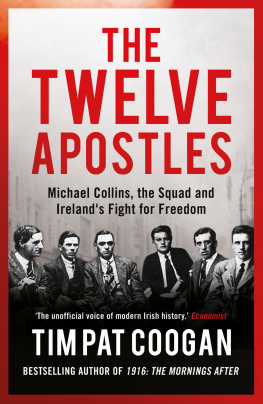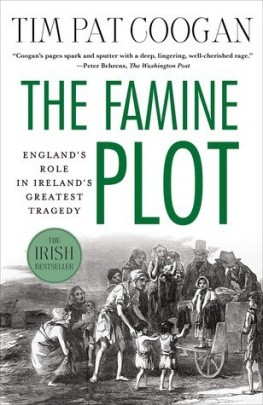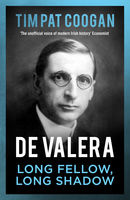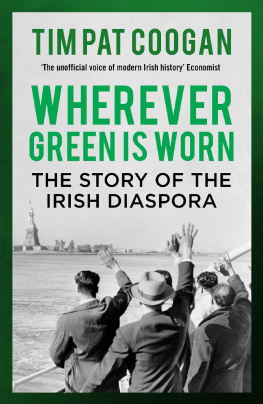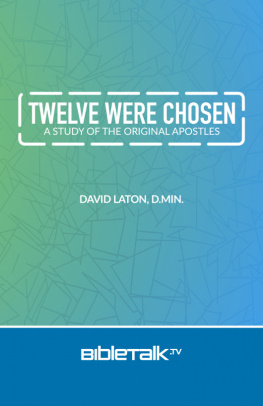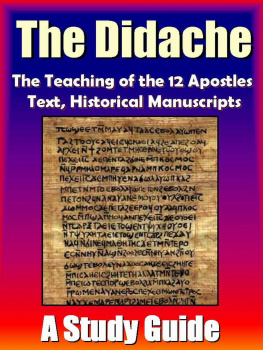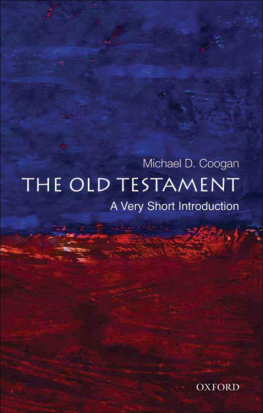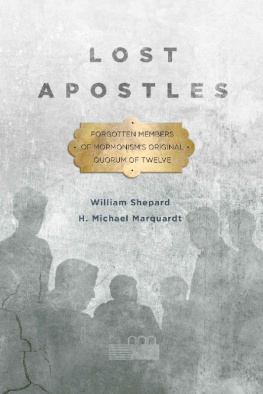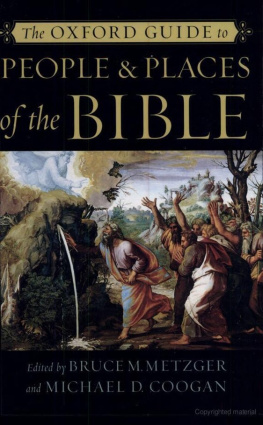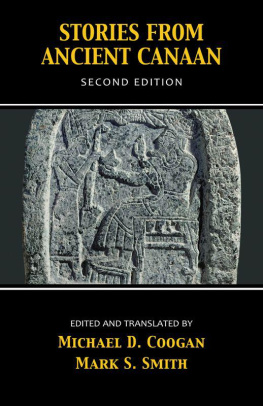Tim Pat Coogan - Twelve Apostles
Here you can read online Tim Pat Coogan - Twelve Apostles full text of the book (entire story) in english for free. Download pdf and epub, get meaning, cover and reviews about this ebook. publisher: Head of Zeus, genre: Science. Description of the work, (preface) as well as reviews are available. Best literature library LitArk.com created for fans of good reading and offers a wide selection of genres:
Romance novel
Science fiction
Adventure
Detective
Science
History
Home and family
Prose
Art
Politics
Computer
Non-fiction
Religion
Business
Children
Humor
Choose a favorite category and find really read worthwhile books. Enjoy immersion in the world of imagination, feel the emotions of the characters or learn something new for yourself, make an fascinating discovery.
- Book:Twelve Apostles
- Author:
- Publisher:Head of Zeus
- Genre:
- Rating:5 / 5
- Favourites:Add to favourites
- Your mark:
- 100
- 1
- 2
- 3
- 4
- 5
Twelve Apostles: summary, description and annotation
We offer to read an annotation, description, summary or preface (depends on what the author of the book "Twelve Apostles" wrote himself). If you haven't found the necessary information about the book — write in the comments, we will try to find it.
Twelve Apostles — read online for free the complete book (whole text) full work
Below is the text of the book, divided by pages. System saving the place of the last page read, allows you to conveniently read the book "Twelve Apostles" online for free, without having to search again every time where you left off. Put a bookmark, and you can go to the page where you finished reading at any time.
Font size:
Interval:
Bookmark:

www.headofzeus.com

The story of the assassination squad that changed the course of Irish history...
After their release from English jails, the surviving rebels of the 1916 Easter Rising concentrated on fighting political battles under the banner of Sinn Fin. In the general election of December 1918 Sinn Fin won an overwhelming majority of parliamentary seats across Ireland and, in early 1919, created the Dil, declaring it to be the parliament of the independent Irish Republic.
When Westminster declared the Dil illegal, a vicious guerrilla war broke out between the Irish Republican Army and crown security forces. To counter Britains efficient network of spies and informants, IRA intelligence chief Michael Collins created an elite Squad whose role was to assassinate British agents and undercover police. The mayhem created by the Twelve Apostles, culminating in the events of Bloody Sunday in November 1920, would eventually bring the British to the negotiating table and hasten Irish independence.
As well as describing the deadly activities of the Squad during the War of Independence, best-selling historian Tim Pat Coogan also explores the psychological impact of that violence on men who were mostly Mass-attending Irishmen, and examines the darker role played by certain of the Apostles in the Irish Civil War of 19223.
For Denis McClean, who suggested the book,
and granddaughters Jessica and Olwen,
who made it possible

Michael Collins addresses a crowd at Skibbereen in his native County Cork, on St Patricks Day, 27 March 1922.
I T IS MY CONTENTION THAT M ICHAEL C OLLINS WAS ONE OF the most extraordinary men ever to have been born in Ireland. Collinss remarkable qualities as a man, a citizen, a commander and strategist shine through the years; and to me, they gleam all the more brightly in this centenary year of the 1916 Rising. Almost thirty years ago, I wrote my biography of Collins and he stands at the heart of this book too, because now I want to examine in detail one of his most extraordinary, and certainly most controversial, creations.
This was the Squad, or the Twelve Apostles: the names given to a small undercover unit controlled by Collins which operated in Ireland during the final era of British rule from Dublin Castle. It is crucial to note that the Apostles were by no means superbly resourced indeed, the opposite is the case: the unit was only ever lightly armed: the original .38 pistols held by its members were eventually swapped for rather more powerful but still essentially modest .45 revolvers and in such improbable fashion, these individuals took on the forces of a state that was equipped lavishly with artillery, machine guns, rifles and tanks. The real firepower of the Twelve Apostles, however, originated elsewhere, from sources that the state could neither control nor eliminate: from widespread public support among the Irish in Ireland and abroad (especially in the United States); from sheer idealism; and from an enormously potent intelligence-gathering operation that was also masterminded and run by Collins himself.
Collins was a difficult man. He let off steam by wild bouts of furniture-smashing and wrestling matches. He was given to practical jokes that were not all that funny. He had a volcanic temper, and he could be bullying. Yet he was the Squads alpha and omega; the story begins and ends with this fascinating and controversial character. One mans freedom fighter is, after all, another mans terrorist and nobody in modern Irish history encapsulates this slogan more fully than Collins, who can well be described as both a freedom fighter and a terrorist.
Indeed, Michael Collins was a walking contradiction of a man. He was both an idealist and a realist, with the two conflicting parts fused together by his genius and his incredible energy, his ruthlessness and his compassion. His idealism had taken him into Dublins General Post Office during the 1916 Rising, but the first of his reasons for forming the Squad is contained in recollections following this traumatic week in Dublin. He told his friend Kevin OBrien (as I record in my biography Michael Collins ) that:
It is so easy to fault the actions of others when their particular actions have resulted in defeat. I want to be quite fair about this The Easter Rising and say how much I admired the men in the ranks and the womenfolk thus engaged. But at the same time as it must appear to others also the actions of the leaders should not pass without comment.
They have died nobly at the hands of the firing squads. So much I grant. But I do not think The Rising week was an appropriate time for the issue of Memoranda couched in poetic phrase, nor of actions worked out in a similar fashion. Looking at it from the inside (I was in the GPO), it had the air of a Greek tragedy about it, the illusion being more or less completed with the aforementioned memoranda. Of Pearse and Connolly I admire the latter the most. Connolly was a realist, Pearse the direct opposite. There was an air of earthy directness about Connolly. It impressed me. I would have followed him through hell, had such action been necessary. But I honestly doubt so much if I would have followed Pearse not without some thought anyway. I think chiefly of Tom Clarke and Mac Diarmada. Both built on the best foundations. Ireland will not see another Sen Mac Diarmada. These are sharp reflections. On the whole I think the Rising was bungled terribly, costing many a good life. It seemed at first to be well organised, but afterwards became subject to panic decisions and a great lack of very essential organisation and cooperation.
Collins, then, had not only participated in great and stirring events. He had watched too and he had learned. He had made up his mind that in the new round of fighting, not merely should that round not be bungled it must be a new form of resistance. There was to be no more static warfare such as had been witnessed across Dublin during the Rising, consisting as it did of taking a strong point and holding on gallantly until superior numbers and firepower inevitably crushed the insurgents. This was certainly stirring to behold and support but it was doomed to fail.
In addition, Collins had witnessed the political detectives going about the room full of captured prisoners in Richmond barracks in Dublin, identifying the rebel leaders for the British Army and for the firing squads. It was a grim lesson in the importance of intelligence, of the political police or G-Men, and of the machinery of repression that held the country and this was only underlined further for him when an intelligence officer in Dublin Castle, Edward Ned Broy, smuggled him into Brunswick Street police station one evening. Collins spent a crucial night here sifting through the police records which demonstrated how the collection of political intelligence was an essential tool in the maintenance of British control. Later, his thinking and planning would justify the ruthless means by which he put an end to that control.
In an interview with me, Vincent (Vinnie) Byrne one of the Squads most celebrated members told me:
We were all young: 2021. We never thought we would win or lose. We just wanted to have a go. We would go out in pairs, walk up to the target and do it, then split. You wouldnt be nervous while you would be waiting to plug him, but you would imagine everyone was looking into your face. On a typical job we would use about eight, including the backup. Nobody got in our way. One of us would knock him over with the first shot, and the other would finish him off with a shot to the head. Collins was a marvel. If he hadnt done the work he did, we would still be under Britain. Informers and drink would have taken care of us, but our movement was temperate. Collins would meet us from time to time and say, youre doing great work, lads. There was no formality about him. I remember after the Irish government was set up, I was on guard duty at Government Buildings, and he was Commander in Chief. He saw me and came over to me and put his arm around me and said, How are you going on, Vinny?
Font size:
Interval:
Bookmark:
Similar books «Twelve Apostles»
Look at similar books to Twelve Apostles. We have selected literature similar in name and meaning in the hope of providing readers with more options to find new, interesting, not yet read works.
Discussion, reviews of the book Twelve Apostles and just readers' own opinions. Leave your comments, write what you think about the work, its meaning or the main characters. Specify what exactly you liked and what you didn't like, and why you think so.

